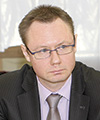
In all, 1,500 people from across the Belarusian regions answered sixty questions. As before (a similar poll was conducted three years ago), they tended to view their money management skills positively, with over half believing their knowledge to be satisfactory, and almost a sixth calling their knowledge good. Two percent claimed excellent skills, on a five-point scale.
However, taking the test, it became apparent that many overestimate their skills, with 20 percent earning only a Grade Two assessment, and 25 percent Grade Three. Thirty percent earned Grade Four, and just over 3 percent demonstrated excellent results, earning a Grade Five. Questions covered such areas as discounts, inflation, interest on deposits and loans, and respondents’ purchasing power.
“The situation is worst of all in the Grodno Region, which lags behind across all indicators. The city of Minsk leads, alongside the Brest and Vitebsk regions,” Svetlana Kroytor explains. “The section on financial awareness gave most difficulties, having theoretical questions concerning rights. For example, do you know what credit history is, and why it’s important? Or the difference between life and risk insurance? Do you know the guarantees a bank provides to investors, in case of liquidation?”
Two-thirds failed to answer these questions at all. Of course, it’s good for people to be aware of the rights of a guarantor, and to know about floating interest rates, as well as credit history and ways to settle conflict with your bank. Experience plays its role. As regards other questions, most Belarusians replied instinctively or answered too simply. This may be why every seventh Belarusian is displeased with their contact with banks. In most cases, misunderstandings arise over deposits and consumer loans. Difficulties are less common for those playing the stock market, or taking car loans or loans for construction and/or purchase of property. At the same time, every seventh person facing problems appears ready to advocate for their interests: a third stated a preference for ending their contract. Just under half stated they would leave everything as it was, even if discontented.
Citizens’ lack of awareness of financial rights and protection is compounded by a belief in benevolent outcomes; 50 percent answered that they thought that both clients and financial organisations would benefit from any court decision regarding finances. Nearly 30 percent noted a belief that only banks would benefit. Citizens of the Grodno Region are most pessimistic, believing that bankers would win half of all cases, with residents of the Minsk and Mogilev regions being more optimistic regarding cases of dispute. Clearly, our citizens feel vulnerable against the banking sphere and financiers but admit that being forewarned is forearmed. They realise the folly of signing contracts in ignorance, especially regarding taking out loans for the purchase and/or construction of housing, or for the purchase of goods, as well as regarding deposits and personal budget planning. People are also interested in insurance and currency transactions but almost 30 percent believe they know enough.
“The situation seems inconsistent when we take into consideration the low level of financial literacy of most Belarusians, even though it has risen slightly over the past three years. At the same time, the number of citizens who believe their knowledge is adequate has risen slightly, by 6 percent. Taking into account Belarusians’ trust in the advice of friends and acquaintances, as well as Internet information, we can guess at what can happen!” warns Ms. Kroytor.
Data shows that, as regards financial literacy, Belarusians lags behind Sweden, Norway and Denmark, who lead in having 71 percent of citizens classified as ‘financial experts’. We may yet catch up, having a general desire to do so.
 Sergey Kalachits, Deputy Chairman of the National Bank’s Board:
Sergey Kalachits, Deputy Chairman of the National Bank’s Board:
Our country is paying special attention to the issue of enhancing citizens’ financial literacy. With this in mind, state bodies and players on the financial market have prepared a joint plan of action for 2013-2018. Over the past three years, many initiatives have been realised, including our country’s participation in an annual global campaign to enhance financial literacy among children and young people: Global Weeks. The National Bank and the Education Ministry have been offering classes on the forthcoming denomination, at over 3,000 educational establishments, with financiers acting as teachers. A contest seeking out the best economic plans is in its final stage among university students.
Everything we’re doing requires analysis and assessment of efficiency. The results of the National Academy of Sciences’ study will be looked at in detail at the next session of the Interagency Coordination Council of Improving Financial Literacy of the Population, to inform further work.
By Maria Dronova











